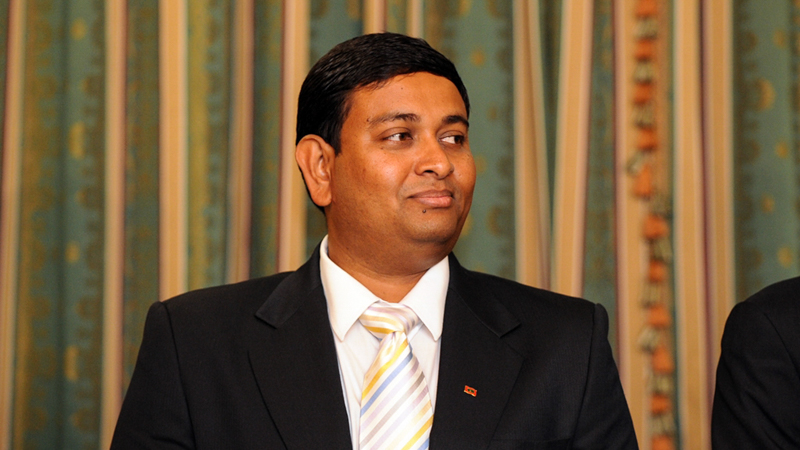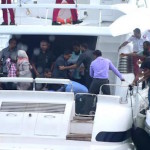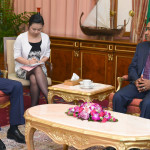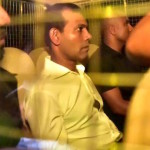Feature & Comment
Q&A: Fisheries minister takes questions on Maldives crisis
Mohamed Shainee speaks about the Maldives United Opposition, rifts within the ruling party, talk of the transition of government and how President Abdulla Yameen keeps his cabinet together: by sending the message, ‘Whatever you do, you can’t get away with this.
Published
8 years agoon

“I was hesitant in granting this interview.” The confession comes within the first minute of our meeting. Mohamed Shainee, the fisheries and agriculture minister, wearing a crease-free white shirt with cufflinks, his hazel eyes boring through me, isn’t in the mood for small talk.
“The Maldives Independent hasn’t been functioning independently,” he says. Every ruling party has, over the years, accused the Maldives Independent of anti-government bias. But this correspondent was the only one waiting outside his chambers. The apparent diffidence didn’t come at the cost of his willingness to engage.
He later eased up as he offered a cup of coffee, and spoke candidly about the Maldives United Opposition, talk of the transition of government, rifts within the ruling party and how President Abdulla Yameen keeps his cabinet together: by sending the message, ‘Whatever you do, you can’t get away with this.’
Shainee is one of the few from the original cabinet of ministers, appointed shortly after the Progressive Party of the Maldives won the presidential elections in 2013. A member of the Maldives Development Alliance, a ruling coalition partner, he is also the government’s representative for the all-party talks, held by the Commonwealth to help mend bridges with the opposition, which has made public its intentions to oust Yameen.
The following is an abridged version of an hour-long interview.
Omkar Khandekar: What do you make of the recent rumours, starting with the BBC article, referring to the removal plot?
Mohamed Shainee: Like you rightly said, they are rumours. There is really nothing factual about it. As an opposition, everyone is aware of what they want. They have been trying to topple this government. If you go back and look at their record, they seem to have brought this government to an end about five times. They have even been giving dates every year.
OK: Could you elaborate on these five attempts made?
MS: The May Day protest was one. They had given a date in September, there was one in August, one in February, coinciding with the protest they had faced earlier. They have been doing it since the beginning. They know that if we achieve our economic objective, they can’t even come close to the ballot box.
OK: These rumours received credence when Mr Nasheed’s father’s home was raided shortly after. The [search] warrant said that he [Mohamed Nasheed] was ‘plotting to overthrow the government’. It now seems like the tension is escalating and the government is reconciling itself to the possibility, unlike our last conversation when you dismissed these threats.
MS: They still aren’t threats to us. The government is very strong. The only way [the opposition] can change the government legally is through the Parliament and we are very sure that that cannot be done. Our supporters and MPs are very satisfied. If they try to do anything, their constituents will not forgive them in the coming elections. Compared to the history of Maldives, there hasn’t been this much development in the 2-3 years. If you travel island by island, there is no constituency that has received so much investment in the history.
On the PPM split and former President Maumoon Abdul Gayoom’s influence
OK: When I speak to some of the constituents and lawmakers, they acknowledge that there are increasing murmurs of dissatisfaction even among the ruling party.
MS: You have seen that there is a rift in the leadership. But for me, it is normal. It is a political party with a small community: families here and there. There will be rifts.
OK: But won’t you acknowledge that the rift has increased over time, to an extent that has never been seen before? There have been talks that Mr Gayoom has been aligning himself with the opposition.
MS: This is the independent nature of this country. Whoever wants to align with the opposition, with a figure that isn’t liked, let him be.
OK: But isn’t it a phenomenal development that the leader of the PPM, and the longest serving President [of Maldives], is said to be aligning himself with another former President [Mohamed Nasheed] who had been jailed under his tenure?
MS: This government is not going to be toppled because the opposition, [the way] I see them, is weak.
OK: Are you saying that Mr Gayoom’s supporters don’t pose a threat either?
MS: People don’t vote for people here. People vote for their performance, their pledges, what you propose for them in the future. If you see the last two years, what we have achieved is much more than Gayoom has.
OK: What position does Mr Gayoom still hold in the country, according to you?
MS: I really have no knowledge. I have been with the government since the beginning even as a lot of people have changed. But it is also a fact that I don’t belong to the PPM. This is what people love about his politics and President Yameen’s way of running the country. We don’t have to be coming from a large family.
OK: That still doesn’t answer my question.
MS: Me saying something doesn’t matter. As I don’t belong to PPM, I don’t know what is happening inside PPM.
OK: If not for within the party, [what do you think about] his influence within the electorate, within the judiciary and the police forces?
MS: These institutions are run independently. There is no connection between how Maumoon is reacting to the political situation and if the police is aligned with that or not. They aren’t political people.
OK: They are not supposed to be. But in 2012, there was a mutiny by the police because they were dissatisfied.
MS: It wasn’t a mutiny. That was dissatisfaction. We are saying that this hasn’t reached to that level.
OK: They were dissatisfied with the way the government was run…
MS: No, [they were dissatisfied] with the president. It is very different. This is a patriotic country. When you sell a part of the country, when you see we are governed by foreigners, people will not stay calm.
OK: You say that the police weren’t satisfied with the president. So even when they are not supposed to be political, they do have an opinion. And at times, it surfaces. Is there is a possibility of it surfacing against Mr Yameen?
MS: When a President [Mohamed Nasheed] comes to the level of the police and asks whether you want me to resign… I mean, who does this? Who gives the authority to police officers to decide? Nasheed wasn’t a politician, he was an activist. He didn’t have the kind of upbringing to be a president. How many times was he jailed before he became a President? Before he contested elections, he went against rules and entered the ballot-box area. People forgave him because they are peace-loving. But he couldn’t run the government because he had no experience.
OK: What do you mean by ‘upbringing’?
MS: When you see a president, you expect him to have experience. He had not held a public office. He was an activist.
On international criticism and Al Jazeera’s corruption exposé
OK: The government hasn’t been able to project itself in good light within the domestic or international media. Do you see that as a failure on the government’s part?
MS: If you talk about news channels here, they are either aligned with the opposition or the government. For the government, it is difficult to make programs as an opposition would. We are always being questioned.
OK: Are you saying the media isn’t independent enough?
MS: They aren’t. In a small country like this with limited resources, either you get your money from an opposition figurehead or… It’s well known in the country. If you look at Raajje TV, they are opposition-aligned TV channel. PSM is referred to as the mouthpiece of the government. As for the international media, we didn’t expect our beloved countrymen to go off a sell off this country.
OK: You mean the opposition figures?
MS: The opposition figures. President Nasheed is from a family that has tried three times to topple the Maldivian government.
OK: You talk about selling off the country. Mr Adeeb has also been accused of the same.
MS: And convicted too, if I may add.
OK: And he was the vice president. So there was an error of judgement in appointing him?
MS: There wasn’t.
OK: So what changed?
MS: Jameel, the [former] Vice President, is now the opposition [MUO] leader. Like I said, you have to understand in the context of the country. It’s a small community. When people think you can topple the government so easily, you will make every effort to do it. That’s why President Yameen is so desperate to uphold the rule of law.
OK: So desperate, some would say, that he has sacked or made sure that over 20 ministers have resigned over the past years.
MS: Not really. Ministers come and go.
OK: Doesn’t that indicate that the government is fractured and can’t keep them together?
MS: No. It shows that this country’s social fabric has been eradicated by the previous President – President Nasheed. President Waheed was a very good President but he wasn’t able to do anything… because Nasheed created similar pressure he has created now.
OK: That’s a disproportionate response for five years of Mr Nasheed and Waheed vs 30 years of Mr Gayoom.
MS: This country was very stable [in Gayoom’s times].
OK: You’re saying the country’s social fabric changed in five years?
MS: In 2005, when President Nasheed walked on the street trying to bring democracy or whatever, I was in this building in the east-end, the convention centre. I was in a meeting when he and his people came protesting and arsoned (sic) my motorbike. I was only a civil servant at the time. They set the High Court on fire. I don’t say we didn’t need a multi-party system but the way it was brought from 2004 and 2005, it is when we became so polarized. We haven’t been able to come back since.
OK: But he [Mohamed Nasheed] continues in his efforts. What do you think he has in mind to ‘topple’ the government?
MS: I know very clearly what he is doing. He isn’t going to be able to do it. He isn’t going to get support from cabinet and MPs.
OK: You say it is because the cabinet is strong. But considering the sackings [and resignations], there have been arguments made that it is the fear that is keeping them together.
MS: No. It’s the courage of the president to bring a change to the country. ‘Whatever you do, you can’t get away with this,’ is the message he is sending. If you are doing something you are not supposed to, you are responsible. It’s not out of fear.
OK: The Al Jazeera documentary has faced a severe backlash. Why are people commenting on it when nobody has seen it?
MS: Our first issue is that it is about the president, about the country. We have a legitimate responsibility to react to it. But under normal journalism guidelines, we haven’t been given a right to response.
OK: But why the criticism when nobody has seen it?
MS: But did the government release a statement on it?
OK: You say you are not in favour.
MS: The questions we have received from them is baseless. We have a right to go against that. The government has, through a legal firm, asked them if they have given the government a right of response, if they have followed their own guidelines, if they know of a criminal activity in the country, and if so, if they have reported them to the police. We haven’t asked them to stop the screening. They have said that there was [an Al Jazeera journalist] in the country. Did he have a visa? Did he come on a tourist visa? These are legitimate questions.
OK: The state media seems to say that the producer Will Jordan was a ‘non-Muslim’ and that had a role to play [in the making]. Do you think so too?
MS: If you look at Will Jordan’s CV that I have seen on Google, he is very proud to say he has brought down a government. We have seen him to be affiliated with the opposition. Can he give an unbiased report?
OK: But you haven’t seen the report.
MS: What he has been saying, what the opposition has been saying, what they have posted publicly, we have to look at it. But we haven’t asked them to stop anything.
OK: So the screening will go on as scheduled?
MS: It’s up to Al Jazeera to do it. It’s up to us to report if there’s anything defamatory.
OK: If the government thinks the documentary isn’t factually accurate, will it take up a case against them?
MS: Definitely. Why not?
On political violence and criticism of ex foreign minister
OK: In a recent interview with Sangu TV, you said that the government “won’t hesitate to shed blood” to defend the president.
MS: Did you see the program?
OK: That’s exactly what you said, from what I understand.
MS: That’s what the opposition has been saying. Whenever a government has been toppled, it has been with the help of foreign militants. The person who has done the most is in charge of it: President Nasheed and his family. He is now with the people who have brought bloodshed in the country. I’m talking about Luthfi. During his term, President Nasheed had released him and he is now living at large in Sri Lanka. So there is a fear that they might be plotting something. Maldivians are intelligent people. When you have done something, you learn from it. Our military forces are ready for this now. We weren’t ready on November 3 [1988]. So before the militants come and topple this government, they have to shed our blood into this land.
OK: You talk about their leader. Who are these militants?
MS: Whenever there has been a coup attempt, it was [by] paid foreign militants. [The incident on] November 3 had a Sri Lankan [mercenary]. So I told the public that you need to be aware of it.
OK: These militants, from what you tell me, seem to be foreign mercenaries. How about if people from your own country pose a threat?
MS: I don’t want to speak of something that is not going to happen.
OK: You did talk about mercenaries being killed, speculatively.
MS: For mercenaries coming from out of the country, the nation will stand up.
OK: But do you think that’s a possibility any time soon?
MS: President Nasheed’s family has tried 2-3 times. They are so desperate, I am not sure they won’t do it [again].
OK: You have criticized the former foreign minister [Dunya Maumoon] and said that she was a failure. Could you elaborate?
MS: I was asked a question about Dunya [in a recent interview] that she has used all the opposition taglines or headlines and she has been tweeting that. I said that it’s kind of funny that she was on the failing side. The family lost the elections at that time. That she has resigned from the government is a failure.
OK: It seems like a moral ground she was coming from.
MS: The day she resigned, she was in a meeting with us at 10 o’clock, talking for the [gestures with a rope around neck] death penalty. Where are the moral grounds? In the cabinet meetings, she never defended it.
OK: What led to her change of mind?
MS: I don’t know. Ask her again.
OK: I’m sure you have a theory though.
MS: I have many theories. I know some facts as well. But I am not going to say it. It’s for you to find out.
OK: On August 31, I saw a significant deployment of police and military on a lot of prominent streets and corners of Malé. That was Malé on the most high-alert in a while. Roads to president’s house cordoned off, much before the protestors even showed up. What happened?
MS: There must be some intelligence. This happens now and then. We have issued a state of emergency recently. I won’t say it was serious. I was out on street at 11.30 am without security. I was not informed that there was a threat to me or the government. But countries have their own intelligence sources.
Related Posts
 Sanctions, elections, the Maldives and India: A Q&A with Mohamed Shainee
Sanctions, elections, the Maldives and India: A Q&A with Mohamed Shainee Fact-checking the Maldives fisheries minister
Fact-checking the Maldives fisheries minister Maldives government launches media offensive on boat blast
Maldives government launches media offensive on boat blast Maldives to partner with Saudi Arabia and China on mega projects
Maldives to partner with Saudi Arabia and China on mega projects Lawyers granted access to imprisoned former president
Lawyers granted access to imprisoned former president Nasheed denied access to lawyers
Nasheed denied access to lawyers

Maldives Independent suspends operations

Iyaz on Female Circumcision

EPA rejects Maafaru runway expansion project

Infrastructure development pushing islands to ‘tipping point’








